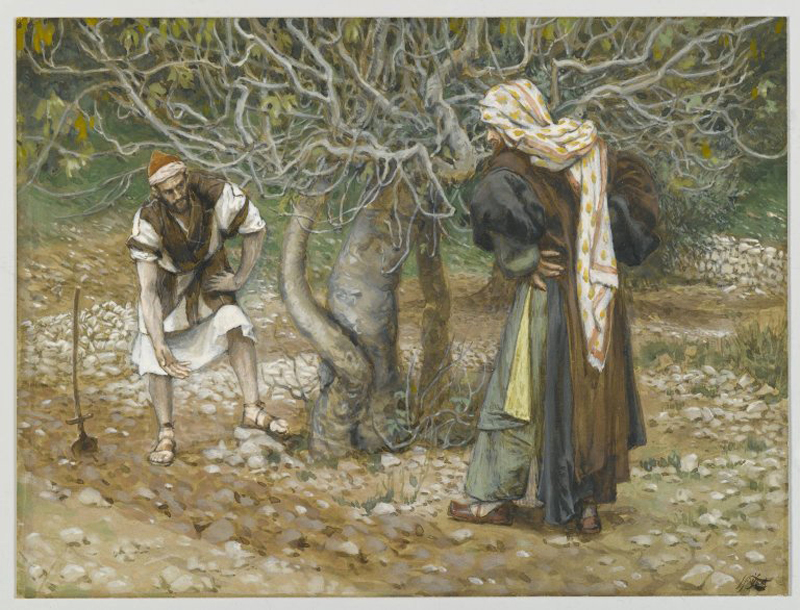
Vine Dresser and the Fig Tree
James Tissot, ca. 1890
My dear friends,
Luke 13:1-9 begins with an account of terrible tragedies — Pilate’s massacre of Galileans and a tower collapse in Siloam. Some around Jesus interpret these events as divine punishments for sin. Yet, Jesus refutes this, proclaiming, "Do you think that these Galileans were worse sinners than all the other Galileans because they suffered this way? I tell you, no!" Instead, he urges all to repent.
This teaching aligns with the Buddhist understanding of karma, not as punishment but as cause and effect. Karma is not a divine instrument of retribution, but the natural result of a web of complex causes and conditions, including our own actions and intentions, among many others, which may be beyond our immediate understanding. As the Buddha has said:
is an unconjecturable that is not to be conjectured about,
that would bring madness and vexation to anyone who conjectured about it.
- Acintita Sutta: Unconjecturable
The focus on repentance also echoes Buddhist teachings about the transformative power of changing one's mind. Repentance, or changing the direction of our thoughts and actions, can break us free from negative patterns of behavior. It is a step towards enlightenment.
The second part of this passage is the Parable of the Fig Tree. In this parable, the owner of a fig tree, which has not borne fruit in three years, orders it to be cut down. Yet, the gardener asks for one more year to fertilize and tend to it, hoping it will bear fruit.
In this story, we see deep wisdom about patience, hope, and the potential for transformation. We can liken the fig tree to our own lives. At times, we may feel barren, unproductive, or stuck in our spiritual growth. We may be harsh with ourselves, like the tree owner, wanting to cut down the tree because it does not meet our expectations.
However, the gardener, representing the compassionate presence of Jesus or Buddha-nature, reminds us to cultivate patience and tenderness. We must give ourselves time, nurturing our spiritual soil with love, understanding, and spiritual practice. Then, the fruit will come naturally. The fig tree's potential to bear fruit is inherent; it just needs the right conditions to blossom, as do we.
Nonetheless, the dimension of urgency is a crucial part of this parable. The owner of the vineyard gives the fig tree one more year to bear fruit. This not only signifies divine patience but also the finite nature of our human lives, our limited time to turn towards what is wholesome, to "bear fruits worthy of repentance" as John the Baptist said.
From a Buddhist perspective, this can be likened to the preciousness and impermanence of human life. It is said that being born as a human being is incredibly rare and precious, providing us with the unique opportunity to achieve enlightenment, to develop love, compassion, and wisdom.
But, this opportunity will not last forever. Our life is impermanent, like a candle flickering in the wind. Hence, we must make the most of this precious opportunity. We must use our time wisely, striving to cultivate virtues and reduce harmful behaviors.
In the Christian context, the same urgency applies. Life is brief, and it is vital for believers to repent and live a life that reflects their belief, to "bear fruits" in keeping with repentance. The opportunity to change our hearts and lives, though graciously extended, will not last forever.
Both teachings urge us to make the most of this precious human life, to strive for spiritual growth and transformation, to cultivate love, compassion, wisdom, and righteousness. They remind us that our time here is limited, and we must not waste it in heedlessness but use it to unfold our highest spiritual potential.
And after death one's good and evil deeds / Trail after one like the shadow trails the body.
Understanding that this most certainly is true / May I discard every level of wrong
And generate an infinite mass of goodness; / Inspire me to be thus continually aware.
- The Foundation of All Perfections (3,4)
So, on this third Sunday in Lent, may we reflect on these teachings and our own spiritual journeys. Let us recognize the suffering and challenges in our lives, not as punishments, but as opportunities for growth and transformation. Let us tend diligently to our spiritual lives with patience and compassion, trusting in our inherent potential to bear the fruits of wisdom and compassion.
May all beings have happiness and the causes of happiness. May they be free from suffering and the causes of suffering. May they not be separated from the great joy that is devoid of suffering. May they dwell in great equanimity, free from greed, fear, hatred and prejudice.